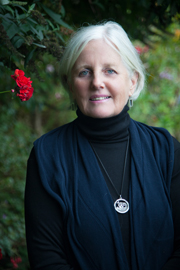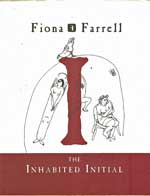Fiona has published four collections of poetry over 35 years, from 'Cutting Out' to 'The Broken Book' which includes 21 poems relating to the Christchurch earthquake. 'The Broken Book' is detailed on this website under Non-fiction.
'The Popup Book of Invasions' was a finalist for the NZ Montana Book Awards for Poetry 2008.
She has contributed to numerous anthologies, and a number of videos have been recorded featuring her poetry, notably 'Charlotte O'Neil's Song' by the BBC.
Fiona’s most recent publication is
'Nouns, verbs, etc. (selected poems)' (OUP, 2020).
This includes work from each of her previous books and intersperses them with other poems thus far 'uncollected'.
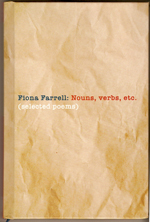
|
|
Cutting Out
Auckland University Press 1987
‘a sharp succession of images that sometimes mixes satire and song…Beside its brief often slant approach to experience, more traditional poetry can look earnest and wordy. This is poetry aware of a wide audience, brighteyed, upbeat’ The Press, 6 June, 1987
‘..her work has similarities to Adcock…direct and explicit and displaying a gift for economical and vivid description ...It is good to see another feisty, imaginative, assertive woman joining the ranks of our New Zealand poets.’ Charles Croot, ODT, 17 June, 1987
|
'Engines can cut out in mid flight.
Voices can cut out in mid sentence.
You can cut out flab and clutter to leave a shape clean.
And you can cut out dolls and clothes and houses which from the front look real but viewed side-on are merely bits of paper..
These poems are shapes, patterns, illusions, silences, songs.'
|
|
The Inhabited Initial
Auckland University Press 1999
"The poems in this book are moving in various ways, for they both take themselves seriously but refuse to take themselves seriously... the four sections of the book are strongly contrasted in mood and subject, yet something ties them together too . . . the author's voice of course, and the author's vision . . . Words, war and water." Margaret Mahy launching The Inhabited Initial on 9 October 1999, during the Canterbury programme of the 1999 Listener Women’s Book Festival.
|
''Inhabited initial' is the formal calligraphic term for the decorated capitals of medieval manuscripts where tiny figures from everyday life, mythology and fantasy invade the text. The poems in this collection are about that invasion.
The Inhabited Initial was designed by Karina McLeod, then the designer for the Dunedin Public Art Gallery, where she has designed a number of art publications, including the catalogue for the Chinese Splendour exhibition.'
|
Margaret Mahy launched The Inhabited Initial on 9 October 1999, during the Canterbury programme of the 1999 Listener Women's Book Festival. She said:
The first poems are short speculations on the symbols of punctuation. To say they are playful is true in a way -- yet they are too sharp, too ecstatic to be merely playful. And almost at once we are into another zone . . . an area even more disconcerting, poems with academic allusion, yet so direct in their statement that one responds just as directly with alarm, horror and the peculiar anguish that only true poetic utterance can exact as it says what it has to say, and in doing so activates something beyond itself -- the squeaking speech of silence, perhaps. Having read the first two sections I stopped for a while to think about the poems and in due course felt as if I owed some sort of apology to the author for not quite expecting that initial shock. Readers should have their moments of humility, not only towards the writer but towards the words themselves -- towards sinuous language which is so commonplace and so remarkable.
The poems in this book are moving in various ways, for they both take themselves seriously but refuse to take themselves seriously. Just as you have unconsciously assumed you can predict their courses, they flick themselves away at eccentric angles . . . and all this -- the establishment of an expectation and the exploding of the expectation -- in a few lines. Some of the poems deal with essentially human themes of alteration, loss and the terrible way we distort the world, but others are concerned with language and the appearance of print on a page -- meditation, the author says, on the miracle of the western alphabet and its origins in early Semitic pictograms. Changes of mood are definitely there -- the four sections of the book are strongly contrasted in mood and subject, yet something ties them together too . . . the author's voice of course, and the author's vision . . . Words, war and water.
The Inhabited Initial is illustrated with specially commissioned drawings by Dunedin jeweller Ann Culy. Ann trained at the School of Fine Arts at Canterbury and the Otago Polytechnic, has taught art, and has a background in painting, drawing and sculpture.
‘But where’ this country’s soul?’ asked the visiting novelist . . .
It is written in the bird code
Of the philosophers.
It is in the curl of a fist
unfurling like bracken shoot.
It is in my cousin’s jersey.
My aunt wrote that jersey
in purl and plain, using
nothing but a pair of pointed
sticks.
It is in block letters at dam or bridge
and in the sly graffiti of water at
their foundations.
It is scrawled in dust
with a skid! and a whoop!
at the corners.
It is in the sweet calligraphy of air.
It is passed breath to breath.
It is not always available for comment.
What it's like
Well, it's kind of like
you're hanging over a
steep drop, fingers
cracking on some old
root or other and below
there's sand or river,
boulders worn to solid
spheres, and you say to
yourself, "Now, I could
let go." And what do
you know?
You do.
And then, it's kind of like
singing with your feet off
the pedals, bush lining a
damp black road downhill
to the corner and a creek
like a crowd hanging about
in dappled shade for you
to whistle by.
And then, it's kind of like
lying in a hillside, sun
full on and a gum tree
rattling away like streamers,
and there's a whole kind of
shining party going on,
and you're at it.
|
The Pop Up Book of Invasions
Auckland University Press 2007
Finalist NZ Montana Book Awards 2008
‘a superlative collection…bursting with ideas presented with warmth, wit and humanity.’ Iain Sharpe. Sunday Star Times
"a rich stuffing of literary allusion and magical imagery . . . A collection too big, in every way, to read at a sitting: take it on a poem-a-day tour" - Tina Shaw
"This is a wonderful collection of tough, sinewy, restlessly intelligent poems...In ways that will be intimately recognisable to most New Zealanders, Farrell’s superb new collection explores the multiple “invasions” that structure, and deform, our identities – making us all “invaders” even in the places we have been taught to call home." Hugh Roberts. Listener,
|
'This wonderful new collection The Pop-up Book of Invasions is written out of Fiona Farrell's experience in Ireland on the Rathcoola Writer's Residency in 2006.
The poems draw heavily and vividly on the landscape, history and mythology of Ireland, sharing a sense of discovery, but they also make connections with home, New Zealand, childhood. Thus a canoe in the National Museum, 'Black boat from a brown bog', recalls the waka: 'You think of yours as I think of/mine, setting sail in their black/canoe'. The poet also remembers her Irish father now dead who emigrated to New Zealand and all the many migrations or 'invasions' of the past and the present. And she adapts and transforms several ancient Irish texts, rewriting their stories for a contemporary world; the voluminous notes are a fascinating Irish education in themselves. A beautifully constructed, thoughtful, topical and original book.'
|
Rail
He saw it once: Ireland.
A smudge from the ship's
rail as they sailed out
from the Clyde.
'Come here!' his mother
said. Cheeks flushed,
breath short, jute dust
from the sacking factory
making old rope of her
lungs.
She lined them up at the
rail: all her children. One
two three four five six.
'That's Ireland,' she said.
Their distant home away
from wherever they might
be. They gazed from the
rail like gangly calves at
those distant greener fields.
Eire apparent
by Hugh Roberts
Fiona Farrell digs for Irish roots in a superb new collection of poems.
What is it about the Irish diaspora that has given it such a fatal weakness for sentimentalising twaddle? For a people who have produced a disproportionate number of the masterpieces of “English” literature, the Irish – particularly those “Irish” who were born and raised with never a sight of the “auld sod” (or is that the “Emerald Isle”?) – seem to lose almost all capacity for critical thought as soon as the country slips beyond the horizon.
My heart sank when I read that Fiona Farrell’s latest collection, The Pop-Up Book of Invasions, was the product of a six-month stay in Ireland by this “descendent of Irish tenants, an illiterate scrum of Farrells, Slavens, Malones, O’Tooles and Dalys”. Farrell is twice-removed from Ireland – her father born in Dundee where his parents had fled Ireland’s 19th-century misery – and all the more primed, one would imagine, for the typical schwarmerei of half-digested Yeats and the loving rehearsal of the depredations of perfidious Albion.
Well, surprise! This is a wonderful collection of tough, sinewy, restlessly intelligent poems. They trace with marvellous acuity the complex intersections of culture, history and place in family and personal identity. In many of them Farrell uses Ireland as a starting point for thinking about her New Zealand childhood, shot through, as is typical of so many post-colonial lives, with dreams and hand-me-down memories of a largely mythologised homeland.
The poem “Spades”, with more than a nod to Seamus Heaney’s much-anthologised “Digging”, literalises the search for “roots” in memories of a father’s atavistic potato crop:
I think of my father and his
three spades: the one with the
square handle, smooth from his
hand. The long-handled shovel.
The narrow spade that was the
one preferred to dig the long
shaw.
And me allowed to follow
in his muddy track, carrying
the bucket and setting each
potato in black Kakanui loam
as he had shown me,
with its green shoot facing the sky.
It is the blunt, tactile facticity of this imagery – the catalogue of spades, the “muddy track,” the “black Kakanui loam” – that makes its metaphorical, symbolic extensions feel fully earned and profoundly true: the poet herself as a “transplant” to an alien soil, a plant with roots in the soil of family and national histories, but aspiring towards the unhistoric freedom of the sky.
In “Blow-in”, the poet probes – with a uncompromising honesty that can make us wince – her linguistic and cultural alienation in this land of her fathers:
That bird has a name
But I don’t know it.
It may have three names:
Latin, English and Irish.
But I know none of them
…
My great-grandparents
could not write. A shaky
cross marked receipt for
birth or death.
I can write, but in their
country I speak like a
bird whose tongue has
been split. Cut off at
its root. I perch on a
tree I cannot name and
chirrup:
road
hill
cloud
with my split tongue.
A straggler here.
A straggler there.
Blown in by
mighty winds.
“A straggler here./A straggler there”; Farrell is always aware of the ironies of history’s “mighty winds”. If her Irish background places her in the story of colonialism as colonised, her New Zealand Pakeha identity places her in that story as coloniser. In one of the many richly informative endnotes, she speaks of finding an unexpected empathy with the Anglo-Irish nationalists of the late 19th century: “people I had been taught were the traditional enemy. Something about their love for a country their ancestors had invaded, something about the awkward excess of their attempts to come to terms with a complicated history.”
The title of Farrell’s collection comes from The Book of Invasions, a 16th-century compilation of Gaelic manuscripts describing the history of Ireland’s human settlement as a succession of invasions – first by Noah’s granddaughter and later by Spanish fishermen. In ways that will be intimately recognisable to most New Zealanders, Farrell’s superb new collection explores the multiple “invasions” that structure, and deform, our identities – making us all “invaders” even in the places we have been taught to call home.
THE POP-UP BOOK OF INVASIONS, by Fiona Farrell (Auckland University Press, $25).
Review by Mary McCallum
It didn't win the Montana NZ Poetry Award today but it's still gorgeous. I got it for my birthday and fell in love with a poem that it fell open to which began 'A book is like an/egg...'
Another firm favourite already is Midden which begins: 'Words are piled deep/ here. Middens of /language, dungheaps/ of song...' Farrell is talking about Ireland, the home of her ancestors.
Her publisher AUP says:
The Book of Invasions - Lebor Gabála Érenn - is a compilation of manuscripts describing the very specific discovery of Ireland ('on the fifteenth, on a Saturday') following the Creation and the Flood. The Pop-Up Book of Invasions is Fiona Farrell's poetic response to a six-month stay in Ireland as inaugural recipient of the Rathcoola Residency for Australians and New Zealanders in County Cork.
'Part travelogue, part family record, part song and myth and history rewritten, this collection revels and laments in equal measure in a landscape deeply inscribed with narrative. The poet also remembers her Irish father now dead who emigrated to the Antipodes and all the many migrations or 'invasions' of the past and the present. A beautifully constructed, thoughtful, topical and original book.'
My mother who has Irish ancestors too read it in an evening and couldn't stop talking about it when I saw her. She loved the poem about Farrell's daughter who had dreadlocks not unlike the matted multi-coloured hair of her ancestors. She especially liked the wonderful notes at the end which fleshed out the poems.
Highly recommended.
The title of this book made me think of those children’s books with lift-the-flaps. I half expected poems to pop out of the pages like cut out aliens or monsters but it wasn’t at all like that. The colour of the cover, green with cartoonish yellow daffodils, gives us a small clue that this book is based on Fiona Farrell’s six month visit to Ireland, the land of her ancestors. If you are familiar with The Book of Invasions (Lebor Gabala Erenn) as a “compilation of manuscripts describing the specific discovery of Ireland (‘on the fifteenth, on a Saturday’) following the Creation and the Flood” you might better understand the title.
Some poems did “pop up”. For me, anyway. I like the way NZ shakes Ireland’s hand and introduces itself as a long lost relative, using the waka as a link in The Canoe in the National Museum. The poem begins:
Black boat from brown bog.
The line of it like a new moon
sailing. Cut from a single log.
Then, later, the New Zealand connection:
So this is how you feel, my
friend, before the waka that
had sailed clear through the
walls of the museum to
beach among whale bones.
Wrapped up at the end by:
You think of yours as I think of’
mine, setting sail in their black
canoe.
The people the people the people.
The only thing that detracted was the line break between…my / friend…it annoyed me (perhaps I’m missing something here?) but another had strong appeal - … their black / canoe, which was effective in giving “black” a harder edge and enhanced the overall meaning of the poem for me.
As a Catholic girl who still remembers her own First Communion, I found the contrasts within the landscapes of the poems Gobnait (a revered saint honoured at the well of holy Ballyvourney, particularly by children celebrating their First Communion) and Sheela-na-gig (“…the old one: the dark / hag with her slack breasts / and rattling ribs.”) hilarious. There is a strong connection in the words, both poems finding a home in the same place. In Gobnait the saint is the “patron of bees” but also “the stone woman, / legs spread wide and her / crack rubbed smooth as / Peter’s toe”. Towards the end of the poem “…bees fly among the / gravestones, bearing their / gospel of // busy and sweet.” In Sheela-na-gig, the return of the crack (and as a poet I couldn’t help thinking “craic”):
This is where you come from,
she says. This is where you
go. The cave. The cavern.
The crack.
And what a wonderful punch line at the end:
The great woman of the night
whom the tricky boy thought
to fool, till she said, ‘That’s
enough of that, my lad!’ And
slammed her thighs
shut.
There are extensive notes at back of the book on most of the poems and where specific Irish terms or place names or names of people are used I found them helpful. But they were also distracting. Poems should stand up on their own merits (even “pop up” if you like, in surprising ways) but since the notes were there I found myself flicking back often, particularly reading the notes for the poems I didn’t absorb on the first reading. For me this ruined the natural flow and pacing of the book as a whole. Often the notes gave backstory which didn’t relate to (or enhance) the subject of the poem, making it seem less, rather than more, accessible. Fiona herself says in Marginalia (the notes part at the end of the book) that “poems should stand by themselves – and I hope these do – but when I go to readings I like the asides, just as I like the footnotes in books and the marginal scribblings of an irritable scribe”. So, it’s a personal thing. Might just be me. (Let’s hope she doesn’t mind my “marginal scribblings”).
Dark humour runs through the book alongside faith, history and fable, and it was this aspect of The Pop Up Book of Invasions that I enjoyed the most.
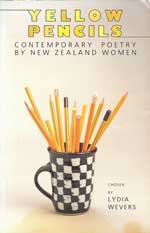 |
Yellow Pencils
Contemporary Poetry by New Zealand Women
Oxford 1988
Chosen by Lydia Wevers
"Jigsaw", "Resolution Bay", "Cemetery, Oamaru", "Three Births", "Moving", "She dies and I write her letters", "The old house burns", "Night interior"
|
| |
|
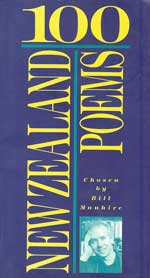 |
100 New Zealand Poems
Godwit Publishing Ltd 1993
Chosen by Bill Manhire
"Charlotte O'Neil's Song"
|
| |
|
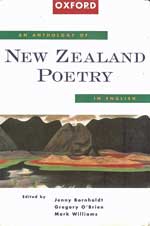 |
New Zealand Poetry
Oxford 1997
ed by Jenny Bornholdt, Gregory O'Brien, Mark Williams
"Reading About the Kendalls, Cambridge 1983"
"Charlotte O'Neil's Song"
|
| |
|
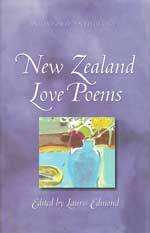 |
New Zealand Love Poems
Oxford 2000
ed by Lauris Edmond
"Seven Wishes", "Full", "Spring" and "Jigsaw"
|
| |
|
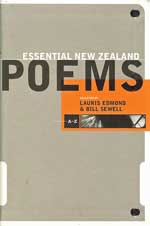 |
Essential New Zealand Poems
Godwit - Random House New Zealand 2001
selected by Lauris Edmond & Bill Sewell
"Creed" and "What it's like"
|
| |
|
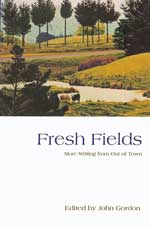 |
Fresh Fields - More Writing from out of Town
Shoal Bay Press 2001
ed John Gordon
"Sheep"
|
| |
|
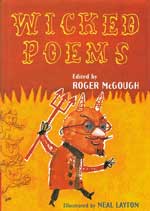 |
|
| |
|
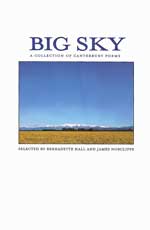 |
Big Sky
A Collection of Canterbury Poems
Shoal Bay Press 2002
Selected by Bernadette Hall and James Norcliffe
"Penguins"
|
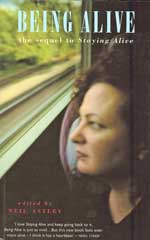 |
Being Alive
Bloodaxe Books (UK) 2004
ed Neil Astley
"Credo"
|
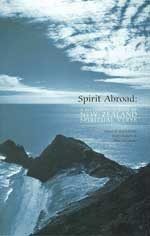 |
Spirit Abroad
Second collection of New Zealand Spiritual Verse
Godwit - Random House New Zealand 2004
ed Paul Morris, Harry Ricketts & Mike Grimshaw
"But where's this country's soul? asked the visiting novelist"
|
| |
|
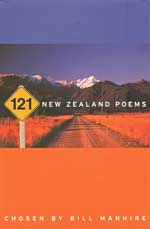 |
121 New Zealand Poems
Godwit - Random House New Zealand 2005
chosen by Bill Manhire
"Charlotte O'Neil's Song"
|
| |
|
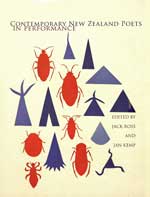 |
Contemporary New Zealand Poets in Performance
(with audio CD)
Auckland University Press 2007
ed Jack Ross and Jan Kemp
"Anne Brown's Song", " Instructions for the Consumption of your Humanitarian Food Package"
|
|
Our trip to Takaka
Well, we went to Takaka
for the weekend
and there was this spring.
Yes.
This spring.
And we could see under the
water with this mirror thing.
And there was this eel.
Yes.
This eel, swimming from right
to left like a reel of silk ribbon,
like a pennant waving.
You know: a pennant,
with teeth and an eye like a
silver stud among all this
pondweed. And there were
all these bubbles. Each one
was like a little world
rising in its sleek skin.
And then we went to see
the goldfields.
Yes.
Goldfields.
And there were these caves
in scrubland. They’d stripped
the hills till the ground ran red.
And we went into one of the
caves and there was this young
man sleeping on fern fronds,
meditating to make the world
well. He had his dog with him.
Yes.
His dog.
That’s how we knew he was there.
The cave was deep, like an ear.
Or a belly button. It was deep and
damp, and we heard the dog bark
down in the dark and a young man
saying, “Be quiet!”
The clay in the cave stuck
to our hands like dry blood.
We gave the young man a
bread roll.
Yes.
A bread roll.
With cheese and egg. And we
said, Well, good luck with the
meditating and everything.
He said, yeah, well, he was
going to give it his best shot.
Then we drove home.
Yes.
Home.
That was our trip to Takaka.
Farrell comments: ‘I wanted to write something dead plain about a meeting which moved me deeply. It’s an “Our Trip” story, deliberately flat, in the tradition of those narratives we have been writing since primary school.
‘The poem is “true”, in the sense that we did indeed go to Takaka, where we met a young man sleeping on bracken, meditating in a cave. It seemed a noble and desperate thing to be doing: a traditional reaction by the young idealist in this post-colonial, post-90s, privatised, globalised beautiful suffering relic of a country.’
Eel
my youth was glass
pip of my heart
threaded
on gut and vein
for all to see
dark currents bore
me west then south
to a place where waves
shattered at a wall
of grey shingle
I wriggled through and
dropped into my life
bird pipe
flax rattle
mud suck
green leaf
spinning on water
suspended in my small
pond I lived my hundred
years forgetful of the sea
beyond the bar knowing
only the dimple of rain
soft blur of stars
growing thick as your
leg on shreds torn from
dead sheep snapping
at flies but never taking
proffered bait
I have lived as you have
lived: cautiously
but now I am old
and the sea knocks
at my head and there’s
a taste to the water
that was not there before
I cannot eat cannot settle
guts shrunk to dry rattle
I turn head on to the current
and swim against the stream
drawn by the sound in my head
my eyes see more clearly
than they have ever seen
they are rimmed with blue
so that I may see in the dark
that lies ahead
I think more clearly
than I have ever thought
my brow flattens so that
I may move without impediment
through the dark that lies ahead
my belly is heavy
frilled with eggs
20 million strung
on velvet
I am become lean
and full of purpose
I cross the bar
on a moonless night
skin scraped blood raw
on sharp shingle
I drop back into the dark
into the ocean where
everything moves faster
and the lights confuse
I find my path my body
freighted with millions
I am heavy with the
future I bear it along
the dark path through
forests of kelp and
booming cavern
following the taste
in the water
and the stars marking
sharp left and right
I swim north then
east one undulating
muscle one blunt head
barking at the moon
I swim to the place
where it is time to burst
I heave and writhe
torn flesh
egg dances to sperm
the water glitters like
broken glass
and now that’s done
I drift upon the surface
empty
old bag
skin for gulls
old bag
Farrell comments: ‘The eel in NZ has some of the same mythic quality accorded to the snake elsewhere. For NZ children it is the sinister creature of deep pools. Researching material for a brochure about Te Waihora/Lake Ellesmere near Christchurch, I became aware of the extraordinary life led by eels, especially the largest long finned females, and as I become older, the lives of old female creatures take on a greater power.’
Falling in love on the way home
I have fallen in love
on the way home
first a lake lay
down beside me
naked to the horizon
then a hill stretched
out its brown arm and
drew me close I could
smell the sweat of its
crevices at every turn
then a harbour licked
my ear whispering the
things harbours say
to all the girls about
other places they have
touched but you’re the
one babe hey you’re
the one
then I reached the
summit and the sky
lifted itself above me
and its face was huge
and tender it breathed
in my hair and its breath
was a hawk hung by a
single thread
then I was flying I was
falling I was out of it
completely rock and cloud
under my shoulders I was
spread like the blue sweep
of the sea
take me I said
take me I’m yours
yours when I was born with
the Waitaki on my left hand
the Pacific at my feet
the Kakanuis at my head
yours today
and yours when I am furled
at last into a crack on your
scarred side to ooze and
crumble in your sweet dark
yours now and forever
my country said nothing
but it leaned back and lit
one
lingering
luminous
sunset
Instructions for the Consumption of your Humanitarian Food Package
Your package contains:
beans in tomato sauce
beans and tomato vinaigrette
biscuits
fruit pastry
fruit bar
shortbread
peanut butter
strawberry jam
utensils
salt and pepper
a napkin and a match
(Contents of food packages air-dropped in Afghanistan, October 2001.)
Instructions:
1.
Catch your package.
It weighs a kilogram.
It has been dropped from
a great height.
Avoid it as it falls.
A can of beans delivered
at speed can become
a lethal weapon. Any
ordinary thing can kill.
Hide as your package falls.
Bury yourself in the red earth.
The fall comes on like thunder.
Its drops are a heavy rain.
Your package may fall upon a
mine field. It may fall upon
your dinner table, thus scoring
a direct hit. It may fall into
the wrong hands, or it may fall into
the hands of children. It may
fall beyond reach. It may fall
upon deaf ears.
2.
Open your humanitarian package
with care. Do not spill its contents on
stony ground. Do not expose its
contents to the scrutiny of sunlight, nor
store it at temperatures below freezing.
Consume immediately, using the knife
and fork provided and spreading your
napkin so that it will catch every crumb.
Wash your hands on the completion of
your meal, using any available water.
Dispose of all wrappings in a manner
which acknowledges the beauty of this
red earth. Give thanks to the force that
sends you food and instruction
from thin air.
3.
There is no recommended sequence
for the consumption of your humanitarian
package. You live in a free world. You
can set a fire with your match. You
can light a candle. You can sharpen
your utensils, or use them to spread jam
on your beans. You can eat this food in
any order and in any combination. You
can add peanut butter to the vinaigrette
or eat shortbread with salt and pepper.
It makes no difference. Should your
belly swell and split like a seedhead
you will see that all food dissolves in
the acids natural to the human stomach.
We do recommend, however, that you
eat fast. There is food for only one day.
There is food for only 35,000 and 6
million are waiting. We recommend
that you dispense with ceremony.
Grab.
Eat while you can.
4.
When they look out at daybreak
they see that the thorn bushes are
coated in sticky substances. The
children of the wilderness are afraid,
not knowing if this be the fruit of good
or evil. But hunger forces its own solution.
They taste, they lick their fingers. They
perch by the bushes like the small brown
birds who fly in flocks, nesting where they can.
They have no proper names because they
are so common, these sparrow children.
They are so many that their fall cannot
be marked from any distance.
They swarm out at daybreak
thousands of them
to strip the bushes,
taking sweet stuff from strangers.
Clean Sheet night
On clean sheet night
they sleep a baby sleep
dream milk dreams
a white lake
white swan circling
snow fallen smooth
over every crevice.
For six nights they have
slipped from perfection
to wrinkled dreams.
Their sheets have
accumulated residues
dead cells
colonies of mites
blood, sweat and seed
the restless mess that
thrives between the lines.
But on the seventh day
the sheets are stripped
to new leaf
clean sheet
smooth as slate.
‘If I were rich,’ she says
toes wriggling as if they
were about to scribble
something new, ‘I’d have
clean sheets every night!
I’d check in as
if life were an hotel,
something sweet
always waiting on my
pillow, towels folded
like envelopes containing
only good news.’
But he knows they need wrinkles.
How else would they recognise
the smell of the sun
the wind’s cool breath
filling every line
the offer made every week
by a pair of clean sheets?
| |
Charlotte O'Neil's Song
You rang your bell and I answered.
I polished your parquet floor.
I scraped out your grate
And I washed your plate
And I scrubbed till my hands were raw.
You lay on a silken pillow.
I lay on at attic cot.
That's the way it should be, you said.
That's the poor girl's lot.
You dined at eight
And slept till late.
I emptied your chamber pot.
The rich man earns his castle,you said
The poor deserve the gate.
But I'll never say 'sir'
Or 'thank you ma'am'
and I'll never curtsey more.
You can bake your bread
and make your bed
and answer your own front door.
I've cleaned your plate
and I've cleaned your house
and I've cleaned the clothes you wore.
But now you're on your own, my dear.
I won't be there any more.
And I'll eat when I please
and I'll sleep where I please
and you can open your own front door. |
|
|
|
|
Nouns, verbs, etc.
(selected poems)
Otago University Press 2020
"Fiona Farrell's Nouns, verbs, etc. presented in handsome hardback form with a bookmark ribbon, is an excellent retrospective of a writer known as much for her prose works as for her poetry. It draws on her four earlier collections but includes 27 hitherto "uncollected" poems. Always concerned with the condition of women, Farrell is remarkable for her ability to draw small personal realities together with the broad sweep of history. Beside an elegy for her mother and childhood memories, there are nods to Farrell's Irish forebears in poems about immigration to New Zealand and reconstructions of a more ancient Ireland. None of this is sentimental nostalgia, but a very hard-nosed view of earlier ways of life. As impressive is Farrell's concern with language itself, her interests taking her from Hittite cuneiform to a slurred drunken conversation in a pub. And of course, there are her reactions to the Christchurch earthquakes. A wide-reaching summation of a poet's career so far."
Nicholas Reid. Listener,
|
Fiona Farrell’s poems look light and lyrical and tidy on the page, which is the way they manage the storms of feeling that race along their lines. These are poems that know how much we yearn for terra firma yet how often we must deal with broken things. They care about family. They speak against injustice. They also know how to rescue the heart and let it sing.
Bill Manhire
Reading this vital, at times urgent book, I am struck by one of Fiona Farrell's favourite words: Io, meaning hurrah - an exclamation mark rendered as a two-letter word. Even when disaster strikes, as disaster does, Fiona finds solace in language and in the minutiae of a rich life. Amid the fierce and dark, there is overwhelming joy in the relationships that sustain us.
Jenny Bornholdt
|
|

